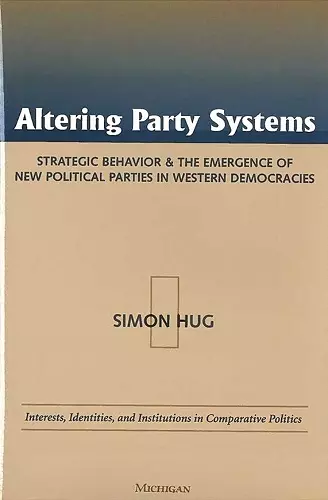Altering Party Systems
Strategic Behavior and the Emergence of New Political Parties in Western Democracies
Format:Hardback
Publisher:The University of Michigan Press
Published:30th Aug '01
Currently unavailable, and unfortunately no date known when it will be back

New political parties have regularly appeared in developed democracies around the world. In some countries issues focusing on the environment, immigration, economic decline, and regional concerns have been brought to the forefront by new political parties. In other countries these issues have been addressed by established parties, and new issue-driven parties have failed to form. Most current research is unable to explain why under certain circumstances new issues or neglected old ones lead to the formation of new parties. Based on a novel theoretical framework, this study demonstrates the crucial interplay between established parties and possible newcomers to explain the emergence of new political parties.
Deriving stable hypotheses from a simple theoretical model, the book proceeds to a study of party formation in twenty-two developed democracies. New or neglected issues still appear as a driving force in explaining the emergence of new parties, but their effect is partially mediated by institutional factors, such as access to the ballot, public support for parties, and the electoral system. The hypotheses in part support existing theoretical work, but in part present new insights. The theoretical model also pinpoints problems of research design that are hardly addressed in the comparative literature on new political parties. These insights from the theoretical model lead to empirical tests that improve on those employed in the literature and allow for a much-enhanced understanding of the formation and the success of new parties.
Simon Hug is Lecturer in Political Science, University of Geneva.
". . . a welcome advancement in the pursuit of meaningful cross-national generalizations about democratic party systems."
—W. M. Downs, Georgia State University, Choice, September 2002
"Considering the frequency with which new political parties emerge in established democracies, the dearth of truly comparative work on this topic is surprising. Altering Party Systems represents an ambitious attempt to fill this gap. Combining formal methods with quantitative analysis, this work aims to identify an underlying logic common to the formation of such parties. . . . Altering Party Systems will undoubtedly provoke considerable debate among party theorists. The author has successfully laid out his argument in such a way as to make the book accessible to readers with little or no training in game theory. . . . [T]his book has a great deal to recommend it and deserves to have a wide readership. In particular, the research design, which combines qualitative, quantitative, and formal modeling, merits wider application in comparative politics."
—Gail McElroy, Trinity College, Dublin, Journal of Politics, November 2002
"By promoting a theoretical, as opposed to descriptive, approach to analyzing new party formation, the book makes a substantial contribution to the new parties literature and points the way forward for future scholars."
—Arnie Kreppel, University of Florida, Perspectives on Politics, March 2003
"Hug's book is an important step forward in examining the conditions under which new parties form."
—Carles Boix, University of Chicago, West European Politics, October 2002
ISBN: 9780472111848
Dimensions: unknown
Weight: unknown
216 pages